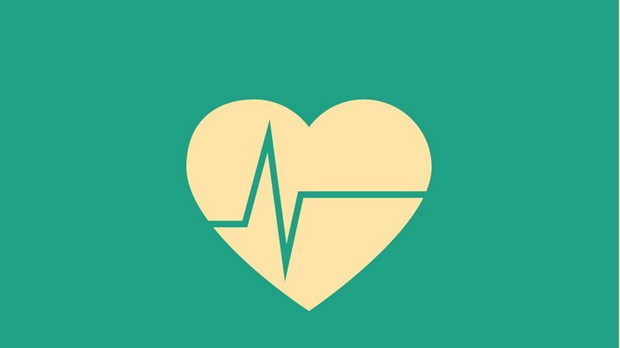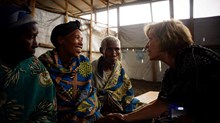What You Don't Know About Heart Disease

Every day a woman loses someone she loves to heart disease.
For Bonnie Arkus, that person was her mother, a vibrant woman in her 60s who remained unaware in the months leading up to her death that her cholesterol had skyrocketed. She attributed the unusual panic attacks she'd been experiencing to stress. She didn't know they actually were early warning signs of a heart attack. Bonnie's mother died from complications of bypass surgery.
Allison Cody also lost her mother to a heart attack when Allison was only 13. Her mom battled a heart condition and was one the first female teenagers to undergo open-heart surgery for the insertion of a pacemaker. She went on to live a full life, raising two daughters. Then, at 36, she suffered a sudden heart attack and died in her sleep.
Cardiovascular disease—which most often results in a heart attack or a stroke—is the number-one killer of women in the U.S. It claims more lives than cancer, osteoporosis, diabetes, pneumonia, or fatal injuries from an automobile accident. About 43 percent of women will die of heart disease. That equates to almost half a million women a year.
Because these numbers are sobering—and because not enough women realize the unique risks and symptoms they can experience with the disease—people such as Bonnie and Allison are working to spread awareness. Bonnie serves as the founder and director of the New Jersey-based Women's Heart Foundation. Allison, a recent graduate of Elon University, aspires to work for the American Heart Association.
For Allison, her mother's death became a turning point in her life. "The day she died, I became a Christian," she says. "I knew I wanted to see her in eternity."
She also realized how important it is not to take your health for granted. "When I hear of women dying of heart attacks who've not taken care of their bodies, I think it's a shame," Allison says. "I wonder, Why did you let your healthy heart go down the drain? You only have one heart and one life."
TCW recently spoke with Barbara Roberts, a top Rhode Island cardiologist and the director of the Women's Cardiac Center at The Miriam Hospital in Providence. She's also the author of How to Keep from Breaking Your Heart: What Every Woman Needs to Know About Cardiovascular Disease (Jones & Bartlett). Dr. Roberts shares how cardiovascular disease can uniquely affect women and how they can better care for their hearts.
Why aren't the dangers of heart disease more widely known?
Like so much else in this country, the media controls what gets promoted. For example, there have been very successful media campaigns to increase awareness and raise money for research in regards to breast cancer. Until recently, women thought they were more likely to die of breast cancer than anything else. Yet women are ten times more likely to die of cardiovascular disease than breast cancer.
Additionally, medicine was a male-dominated profession for centuries. In the 1800s, physicians linked the build-up of plaque in the arteries with certain symptoms men typically experienced. They didn't realize women also experienced the same build-up, but with different symptoms. So for many years, doctors believed men were more prone to cardiac problems than women. And at a certain point in our past, women were more likely to die from childbirth than they were of heart disease. But that hasn't been the case for at least the last century. Nowadays, women are much more likely to die of cardiovascular disease than anything else.
How do the symptoms of heart disease differ between men and women?
As a medical student I was taught the classic symptoms of a heart attack are crushing chest pain associated with shortness of breath, sweating, and a feeling of impending doom. Those are certainly the classic symptoms for men. But if you look for those same symptoms in women, you're going to misdiagnose most cases of a female having a heart attack. Recent research shows that the most common symptom women experience isn't chest pain but shortness of breath. Only about 28 percent of women have the classic chest pain. Women experience this shortness of breath when they're under emotional stress or during regular types of physical exertion. For example, say you routinely climb two flights of stairs at work with no problem, and you start noticing that halfway up those stairs you have to stop and rest because you're so short of breath. That's something you shouldn't ignore.
Any other symptoms to look out for?
Sleep disturbances are very common in the weeks leading up to a heart attack. Many women also complain of unusual fatigue. When I see a woman who has a lot of the risk factors for cardiovascular disease and she then tells me she's suddenly become completely exhausted, I immediately get concerned and order the appropriate tests to see if the source of the problems is her heart.
Name the risk factors of which we should be aware.
There are only two you can't control—your age and your family history. Your risks for a heart attack increase as you age. You're also at an increased risk if you have a history of heart disease in your family. Other controllable factors include smoking, high blood pressure, abnormal levels of blood cholesterol, a sedentary lifestyle, and obesity.
Both the American College of Cardiology and the American Heart Association recommend every American begin having her cholesterol screened at age 20. Many women see an OB-GYN as their main physician. It's important for patients to make sure their physician—even if it's their obstetrician—monitors their heart health. So if a woman's gynecologist isn't regularly checking her cholesterol and blood pressure, she needs to see an additional physician who will do so. If a woman is taking an oral contraceptive, her cholesterol and blood pressure need to be checked because the progesterone in some pills can raise blood pressure or adversely affect the good type of cholesterol found in the blood.
For overweight women, it's also important to have your blood sugar checked routinely. Being overweight or obese are major risk factors for developing diabetes. And once a woman develops diabetes, she's at tremendous increased risk for cardiovascular disease—even more so than a diabetic man. A lot of physicians today worry that this current generation will be the first in many years to have a shorter lifespan than their parents because of the obesity epidemic in our country.
What's the number-one thing women can do to prevent heart disease?
Aside from not smoking and staying away from secondhand smoke, the key is a heart-healthy diet and regular exercise. Eat colorful fruits, vegetables, and whole grains. Meat, including poultry, should be used as a condiment, not as a main entrée. Use olive oil as the main source of your fat calories. Finally, avoid trans fats, those hydrogenated or partially hydrogenated vegetable oils found in almost all processed foods in this country.
Exercise is so tough to fit in. How much is necessary?
Over the course of a week, you should accumulate three hours of exercise. That could be briskly walking for 30 minutes six days a week or doing something else for an hour three times a week. Start small if you need to. Take a brisk walk for ten minutes or swear off the elevator at work. I urge my patients to invest in a treadmill. When I come home from work at night, often I get on the treadmill and walk uphill while watching television. You have to make it part of your daily routine—just like brushing your teeth every morning. There are few guarantees in life, but if you exercise regularly, you will feel better. You'll relieve stress and increase your body's production of beta endorphins, which are natural antidepressants. Most importantly, you'll lower your risk of cardiovascular disease.
Corrie Cutrer is a TCW Regular Contributor who lives in Illinois.
Copyright © 2007 by the author or Christianity Today/Today's Christian Woman magazine.
Click here for reprint information on Today's Christian Woman.
Read more articles that highlight writing by Christian women at ChristianityToday.com/Women
 Read These Next
Read These Next
 Don't Envy Your Single FriendsAlthough my single days were fun, they don't hold a candle to my married life right now.
Don't Envy Your Single FriendsAlthough my single days were fun, they don't hold a candle to my married life right now.
 Refugee Resettlement Isn’t a Political Issue—It’s a Humanitarian IssueIn the world’s “most dangerous place for women,” the greatest fear isn’t rape or death—it’s being forgotten. My heartbreaking experience in a displacement camp for the people of Congo.
Refugee Resettlement Isn’t a Political Issue—It’s a Humanitarian IssueIn the world’s “most dangerous place for women,” the greatest fear isn’t rape or death—it’s being forgotten. My heartbreaking experience in a displacement camp for the people of Congo.








 Homepage
Homepage
